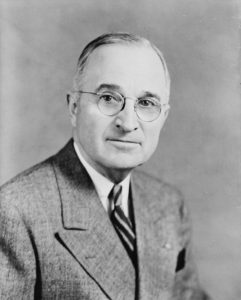 The Palestine situation appeared to be heading swiftly toward chaos, instead of toward solution.
The Palestine situation appeared to be heading swiftly toward chaos, instead of toward solution.
President Truman, at his Thursday news conference, drew a picture of what is likely to happen on May 15, when the British abandon their Palestine mandate, unless some solution is found. He said-
Violence and bloodshed will descend on the Holy Land. Large-scale fighting among the people of that country will be the inevitable result. Such fighting would infect the entire Middle East and would lead to consequences of the gravest sort involving the peace of this nation and of the world.
Four possible avenues of approach to the Palestine problem were under consideration, and each one of them seemed to be hopelessly blocked-
I. Truce
An immediate truce in the fighting between Arabs and Jews was fervently advocated by President Truman in his Thursday statement. He urged the Security Council to get both sides together to arrange such a truce, as the only way to “avert tragedy.”
Both Arabs and Jews said this was entirely out of the question. They called the truce idea “fantastic” and “unrealistic.” Hatreds in Palestine were much too deep and strong to be suppressed at a stroke. The Jews would consent to a truce only if the General Assembly’s partition plan were carried out on schedule, beginning May 15. The Arabs would accept a truce only if all thought of partition were abandoned.
II. British Help
President Truman wished that the British would stay in Palestine and maintain their rule beyond May 15. But this was emphatically rejected by Foreign Secretary Bevin. We are handing the Holy Land over to the United Nations on that date, Bevin told Parliament. “If other people have got it into a muddle, why should the British government be blamed?”
III. Partition
American support already had been withdrawn from the partition plan approved by the U. N. General Assembly last November. President Truman explained why in these words- “Unfortunately, it has become clear that the partition plan cannot be carried out at this time by peaceful means. We could not undertake to impose this solution on the people of Palestine by the use of American troops, both on Charter grounds and as a matter of national policy.”
The President made it plain that he still supported the idea of partition as a future solution, although not as a practical method of dealing with the present emergency.
IV. Trusteeship
The method currently favored by the United States is the setting up of a United Nations trusteeship over Palestine. But this avenue of approach had serious road-blocks, too.
In order to set up a trusteeship, the U. N. General Assembly would have to be called into special session to abandon its partition recommendation and embrace the new method. The United States delegate, Warren R. Austin, was expected last week to introduce a resolution asking the Security Council to call for a special Assembly session. For some reason, he didn’t. The next opportunity will come Tuesday. By the time the Assembly could meet and act, the May 15 deadline might already have passed. Moreover, no one could be sure that the Assembly would be willing to reverse its previous position and espouse trusteeship.
Another important hazard to trusteeship is that both Arabs and Jews undoubtedly would fight it just as vigorously as they did the British mandate rule. Even more troops might be required to enforce trusteeship than partition. Who would supply these troops? President Truman said that if the U. N. agrees to a temporary trusteeship, “we must take our share of the necessary responsibility.” When newspaper men asked him whether he meant that American troops might be used, he avoided a direct answer, saying we would have to cross that bridge when we came to it.
One big difference between enforcing partition and enforcing trusteeship was not mentioned officially, but was talked about freely on unofficial levels. If an international force were sent to Palestine in connection with partition, it would be under the Security Council, and Russian troops presumably would participate. Once established in the Middle East, the Russians might be hard to dislodge. If the U. N. Trusteeship Council were to enforce trusteeship, no Russian troops would logically participate, because Russia has boycotted the whole trusteeship system.
Jews Plan Own Regime
The Jews in Palestine said- “We categorically reject any plan to set up a trusteeship regime for Palestine, even for a short period of time. A trusteeship would necessarily entail denial of the Jewish right to national independence. It would leave Palestine under a foreign military regime.”
Therefore, the Jews declared that they would set up a provisional Jewish government which would start functioning on May 16, as soon as the British lay down their mandate. The statement, issued by the Jewish Agency for Palestine and the Vaad Leumi (Jewish National Council), indicated that they would not try to make the whole of Palestine a Jewish state, as the extremists desire, but that they would abide by the U. N. partition plan, leaving the Arab areas to the Arabs.
The Jews would put their main faith in their militia, the Haganah, to defend them against the Arabs bearing down from all sides upon their tiny new state. The Jewish Agency also suggested that 10,000 Danish and Norwegian troops now in Germany be sent to Jerusalem by the U. N. to protect that city and its holy places after the British leave.